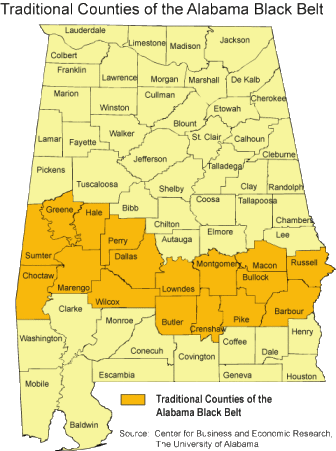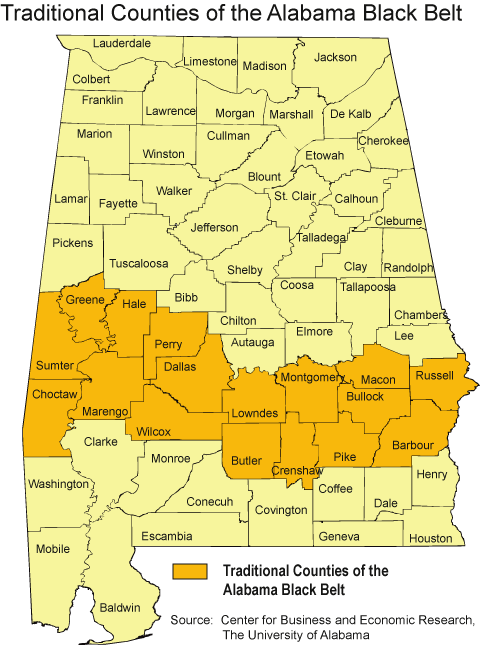
Center for Business and Economic Research / The University of Alabama
Traditional Counties of the Alabama Black Belt
The Southern Poverty Law Center (SPLC) has filed a federal lawsuit against Alabama, alleging that recent legislation that provides tax breaks to families who transfer their children to attend either private schools or non-failing public schools is both discriminatory and unconstitutional.
The SPLC said the Alabama Accountability Act benefits students from wealthier families while “trapping” poorer students inside failing schools, whose general funding would continue to decrease under provisions of the statute.
“In reality, the Act creates two classes of students assigned to failing schools -- those who can escape because of their parents’ income or where they live and those, like the plaintiffs here, who cannot,” the SPLC wrote in the complaint. “Because the Act’s benefits are not equally available to all students and because an education is necessary to prepare students to participate effectively in our democracy, the plaintiff-students are being denied the equal protection of the law as guaranteed by the Fourteenth Amendment.”
SPLC Deputy Legal Director Jerri Katzerman said the legislation also provides for the creation of non needs-based scholarship granting organizations. “Individuals and corporations can donate to an organization that will then dole out scholarship awards, most of which are not based on income-eligibility,” she said.
According to the SPLC, the law discriminates against children living in the so called Black Belt region of the state, a swath of 18 counties stretching across southern Alabama.

Southern Poverty Law Center
Jerri Katzermann, Deputy Legal Director at the Southern Poverty Law Center.
“It’s the poorest region in our state, and one of the poorest in the entire nation,“ Katzerman said. “They are in failing schools, there are no non-failing schools within any reasonable distance and there are no private schools that are either accepting transfers or, again, are within any reasonable commuting distance to them.” Of the 78 public schools classified earlier this year by the Alabama Department of Education as failing, 30 were contained in the region. The SPLC says nine out of 10 children in the state’s failing schools are involved in free or reduced meal programs.
“What’s more, the failing Black Belt schools will deteriorate further as money meant for public education is funneled into tax breaks for families with access to successful public and private schools,” SPLC President Richard Cohen said.
The SPLC, filing on behalf of several students attending classes at failing Black Belt schools, asked a federal district court to block the Alabama Accountability Act. Although the law gives tax credits worth $3,500 per child to families so they may relocate their children out of failing schools, the SPLC said many families in the region will still be unable to do so.
“In a number of Black Belt counties, there are no schools at certain grade levels that are not failing,” the SPLC said in a recent press release. “Because the cost of private schools is prohibitive and because the few public schools in adjacent counties that will take these students are not accessible, many students in the Black Belt cannot escape failing schools.”
Katzerman said schools that rank in the bottom 6 percent on two measurements are automatically deemed “failing” by the state Department of Education.
“But the Act is really designed so that no matter how well a school performs, or if a school manages to improve over a period of time, 6 percent of our schools will always be failing,” she said.
Although the law does not prevent school systems from bussing students out of districts to attend non-failing schools, the SPLC’s clients had not been given such an offer, Katzerman said.
Neighboring school systems that are performing well, Katzerman said, are allowed to place conditions on enrollment. But many districts are “closing their borders” and no longer accepting transfer students.
“That’s what’s really locking these children into these islands,“ she said. “When you look at a map, you see them in these pockets, and they are surrounded by school systems that have closed their borders.” In some instances, Katzerman said, students seeking to attend a non-failing school would have to travel across several counties before finding one willing to accept them.
The Act, she continued, “impermissibly distinguishes” between students facing the same educational predicament.
“We have children in failing schools,“ she said. “Some of them are given a ticket out and some of them are not. And those who cannot punch a ticket and get out are children … who have no way out.”
Ultimately, she considers the law to be the wrong solution to the state’s educational difficulties.
“We have underperforming schools in the state, most of which are attended by poor African-American children,” Katzerman said. “The Alabama Accountability Act does not solve the problem. All it does is divert money from the system.”
